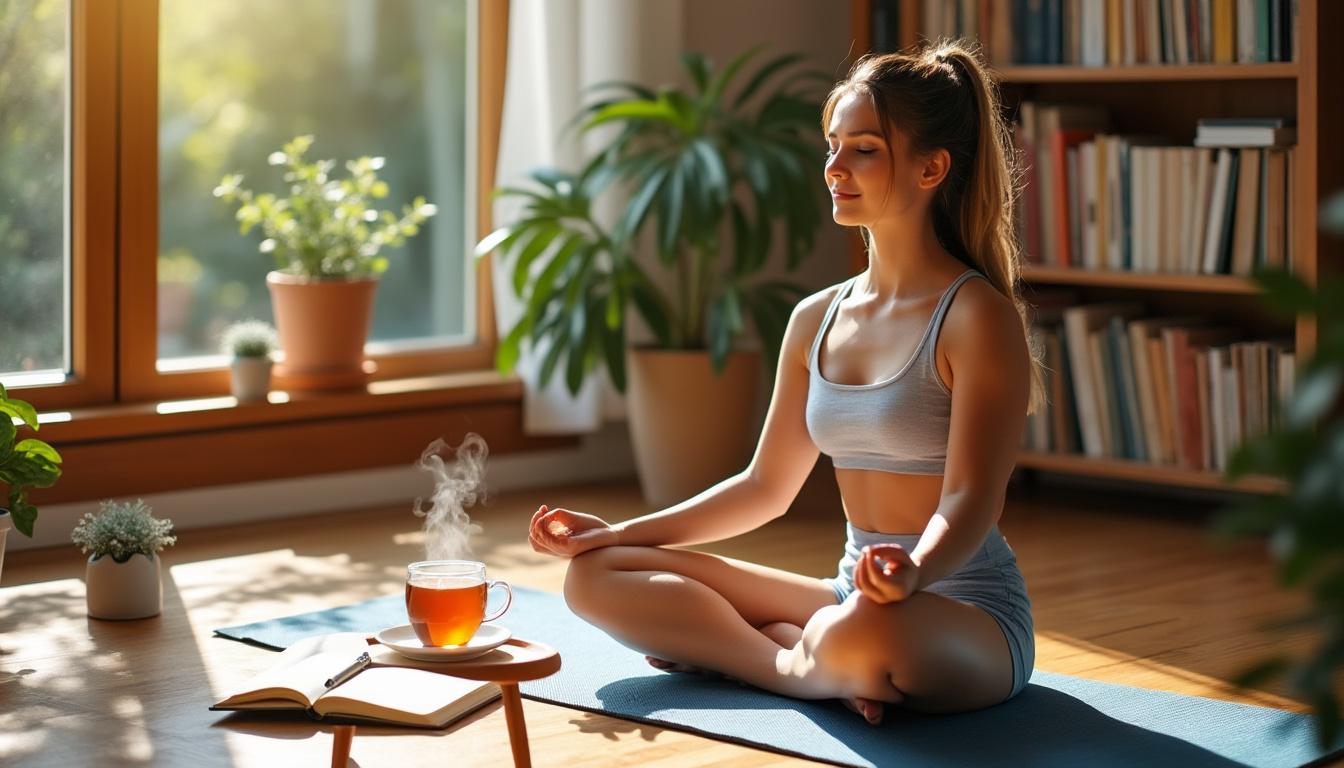In today’s relentless pace, preserving calm and sharpened focus has moved from a luxury to a necessity. The hustle of professional life and personal commitments often generate noise and tension that cloud clarity and productivity. Yet, amidst this whirlwind, simple, intentional daily habits offer a powerful antidote, facilitating a mind that remains centered and a spirit that is resilient. Incorporating these habits not only uplifts mental well-being but also enhances decision-making and emotional balance.
Modern apps like Headspace and Calm have popularized mindfulness and meditation practices that fit seamlessly into busy schedules. Beyond guided meditations, the art of breathing consciously and structuring meaningful routines can transform chaos into calm. This exploration delves into key daily habits, highlighting practical strategies and technological tools designed to cultivate tranquility and sustained focus.
Establishing a Morning Routine for Mental Clarity and Calm
Starting the day grounded plays a crucial role in maintaining calmness and focus. A well-crafted morning routine sets the tone for hours to come, creating a foundation of stability and intention. Research indicates that individuals who adopt structured morning habits experience lower anxiety levels and enhanced cognitive functions throughout the day.
Power of Hydration and Mindful Breathing
Upon waking, drinking a glass of water helps replenish bodily fluids lost overnight and facilitates toxin elimination, a simple act that energizes the body and sharpens alertness. Complementing hydration, mindful breathing exercises stimulate the parasympathetic nervous system, reducing stress hormones and preparing the mind for clarity.
- Drink at least 250 ml of water first thing after waking.
- Practice 3-5 minutes of breathing exercises focusing on slow, deep inhalations and exhalations.
- Use apps like Insight Timer or Breathe for guided sessions.
Implementing these habits aligns with findings noted by mental health advocates who emphasize the impact of hydration and respiratory control on anxiety reduction (reduce anxiety without medication).
Incorporating Movement and Intentional Warm-ups
Gentle physical activity not only wakes the body but also influences neurotransmitter release, fostering heightened focus. Stretching or yoga sequences combined with affirmations can recalibrate the nervous system, enhancing both calm and productivity.
- Engage in 5–10 minutes of light stretching or yoga postures.
- Set intentions or positives affirmations aloud.
- Track progress over weeks to solidify consistency.
| Morning Habit | Benefit | Suggested Time |
|---|---|---|
| Water Intake | Boosts metabolism, flushes toxins | Immediately after waking (5 mins) |
| Mindful Breathing | Reduces cortisol, calms the mind | 3–5 mins post hydration |
| Light Movement | Increases dopamine, improves focus | 5–10 mins after breathing |
Mindfulness and Meditation Practices to Center Attention
Immersing in moments of mindfulness and meditation during the day can anchor the mind amid distractions. With stressors around, these deliberate pauses combat overwhelm, paving the way for clearer thought pathways.
Choosing the Right Meditation App for Your Needs
Today’s technology offers an abundance of tools tailored to diverse meditation preferences. For instance, Simple Habit and Smiling Mind provide bite-sized guided practices perfect for professionals constrained by time.
- Experiment with different apps via best free mental health apps to evaluate what resonates personally.
- Start with sessions under 10 minutes to build consistency.
- Utilize features such as reminders and progress tracking for motivation.
Applying Mindfulness Beyond Meditation
Mindfulness is not confined to meditation cushions. It extends into everyday actions — eating, walking, or working — requiring deliberate attention to the present moment. This embodied presence encourages emotional regulation and cognitive resilience.
- Practice mindful eating by savoring flavors and textures.
- During work, employ techniques like the Pomodoro method with mindful breaks.
- Use apps like Mindfulness App for prompts that cultivate present-moment awareness.
| Mindfulness Technique | Purpose | Duration |
|---|---|---|
| Guided Meditation | Center thoughts, reduce anxiety | 5–15 minutes |
| Mindful Eating | Enhance sensory engagement, reduce overeating | During meals |
| Mindful Work Breaks | Interrupt distractions, improve focus | 2–5 minutes every hour |
Nutrition Strategies to Sustain Calmness and Enhance Focus Throughout the Day
Foods influence brain chemistry more directly than many realize. Maintaining stable energy and mood depends heavily on balanced nutrition, which supports neurotransmitter function critical to calmness and attention.
Key Nutrients and Foods for Mental Stability
Incorporating foods rich in omega-3 fatty acids, magnesium, and antioxidants provides neuroprotective benefits. Examples include salmon, spinach, nuts, and berries.
- Omega-3 rich fish like salmon, mackerel, or plant-based flaxseeds.
- Leafy greens such as kale and spinach for magnesium.
- Fresh fruits, especially blueberries and oranges, packed with antioxidants.
- Avoiding excessive caffeine and processed sugars to prevent energy crashes.
Planning Meals for Steady Energy
Aligning meal timing with the body’s circadian rhythms encourages optimal metabolic efficiency. Eating small balanced meals every 3-4 hours stabilizes blood sugar, preventing mood swings and fatigue.
- Start with a nutrient-dense breakfast featuring protein and fiber.
- Include healthy snacks like nuts or yogurt mid-morning and mid-afternoon.
- Hydrate continuously — water intake supports brain function and combats sluggishness.
| Nutrient | Food Sources | Benefits to Focus and Calm |
|---|---|---|
| Omega-3 Fatty Acids | Salmon, flaxseeds, walnuts | Enhance cognitive function, reduce inflammation |
| Magnesium | Spinach, pumpkin seeds, almonds | Regulates nervous system activity, eases anxiety |
| Antioxidants | Blueberries, oranges, dark chocolate | Protect brain cells, maintain mood stability |
How Quality Sleep Habits Foster Restorative Calm and Mental Acuity
Sleep underpins nearly every facet of mental well-being. Insufficient or disrupted sleep depletes cognitive resources and escalates stress markers, hampering both calm and focus. Prioritizing sleep hygiene promotes regeneration and sharpness.
Techniques to Improve Sleep Quality Consistently
Adopting certain behaviors before bedtime induces relaxation and supports uninterrupted rest. These include maintaining a fixed sleep schedule, reducing screen exposure, and creating a cooling, dark environment.
- Set a consistent bedtime and wake-up time, even on weekends.
- Limit blue light exposure using apps or glasses one hour before bed.
- Engage in calming pre-sleep rituals like reading or gentle stretching.
- Optimize room temperature and use blackout curtains.
Exploring additional strategies for better sleep can be found in resources outlining 5 effective tricks to promote quality rest.
Using Technology to Track and Enhance Sleep
Wearables and apps such as Fabulous and Noom not only monitor sleep duration but also suggest personalized improvements based on patterns detected. Integration of relaxation exercises from apps like Calm can prepare the brain for deep sleep.
| Sleep Hygiene Practice | Benefit | Implementation Tips |
|---|---|---|
| Consistent Sleep Schedule | Supports circadian rhythm stability | Wake up and sleep at the same time daily |
| Blue Light Reduction | Improves melatonin production | Use filters or limit screen time before bed |
| Calm Pre-Sleep Routine | Reduces anxiety, eases transition to sleep | Reading, meditation, or light stretches |
Managing Stress through Self-Care and Effective Digital Tools
Stress management extends beyond moments of crisis, rooted in regular self-care and the prudent use of supportive technologies. Developing a personalized toolkit primes individuals to confront challenges calmly and maintain focus without burnout.
Integrating Self-Care Rituals into Daily Living
Self-care is a proactive approach to mental wellness rather than reactive. Activities like journaling, short walks in nature, or creative hobbies replenish reserves and foster positive mental states.
- Designate 10-15 minutes daily for reflective journaling or gratitude lists.
- Schedule regular nature excursions or calming walks to reconnect and recharge.
- Incorporate hobbies that stimulate creativity and provide a mental escape.
Guidance on structuring such routines can be explored through detailed recommendations on maintaining a self-care routine.
Leveraging Mental Health Apps for Consistency and Support
In the landscape of digital wellness, apps like Pacific and Simple Habit serve as readily accessible companions for managing stress and sustaining focus. Features such as mood tracking, tailored challenges, and community forums provide layers of support.
- Regularly log mood and stress levels to observe trends.
- Participate in guided stress relief sessions as reminders during high-pressure moments.
- Engage in community challenges to maintain motivation and accountability.
| App | Main Features | Recommended Use |
|---|---|---|
| Pacific | Mood tracking, breathing exercises, community support | Daily check-ins, stress management |
| Simple Habit | Guided meditations, personalized plans | Short mindfulness sessions, ongoing focus building |
| Fabulous | Habit building, sleep and nutrition guidance | Comprehensive lifestyle improvement |

